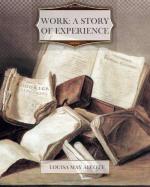“My little Pansy! I put my own sorrow into your baby soul, and now it looks back at me with this strange wistfulness, and these great drops are the unsubmissive tears I locked up in my heart because I would not be grateful for the good gift God gave me, even while he took that other one away. O Baby, forgive your mother; and don’t let her find that she has given you clouds instead of sunshine.”
This fear helped Christie to keep her own face cheerful, her own heart tranquil, her own life as sunny, healthful, and hopeful as she wished her child’s to be. For this reason she took garden and green-house into her own hands when Bennet gave them up, and, with a stout lad to help her, did well this part of the work that David bequeathed to her. It was a pretty sight to see the mother with her year-old daughter out among the fresh, green things: the little golden head bobbing here and there like a stray sunbeam; the baby voice telling sweet, unintelligible stories to bird and bee and butterfly; or the small creature fast asleep in a basket under a rose-bush, swinging in a hammock from a tree, or in Bran’s keeping, rosy, vigorous, and sweet with sun and air, and the wholesome influence of a wise and tender love.
While Christie worked she planned her daughter’s future, as mothers will, and had but one care concerning it. She did not fear poverty, but the thought of being straitened for the means of educating little Ruth afflicted her. She meant to teach her to labor heartily and see no degradation in it, but she could not bear to feel that her child should be denied the harmless pleasures that make youth sweet, the opportunities that educate, the society that ripens character and gives a rank which money cannot buy. A little sum to put away for Baby, safe from all risk, ready to draw from as each need came, and sacredly devoted to this end, was now Christie’s sole ambition.
With this purpose at her heart, she watched her fruit and nursed her flowers; found no task too hard, no sun too hot, no weed too unconquerable; and soon the garden David planted when his life seemed barren, yielded lovely harvests to swell his little daughter’s portion.
One day Christie received a letter from Uncle Enos expressing a wish to see her if she cared to come so far and “stop a spell.” It both surprised and pleased her, and she resolved to go, glad that the old man remembered her, and proud to show him the great success of her life, as she considered Baby.
So she went, was hospitably received by the ancient cousin five times removed who kept house, and greeted with as much cordiality as Uncle Enos ever showed to any one. He looked askance at Baby, as if he had not bargained for the honor of her presence; but he said nothing, and Christie wisely refrained from mentioning that Ruth was the most remarkable child ever born.




